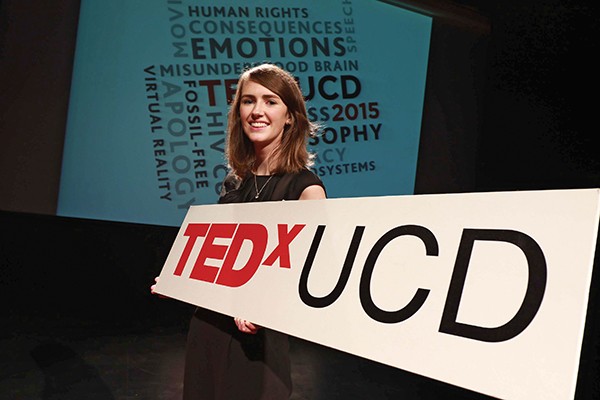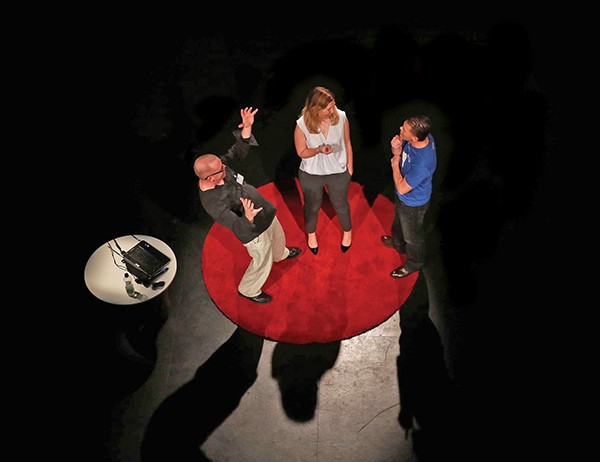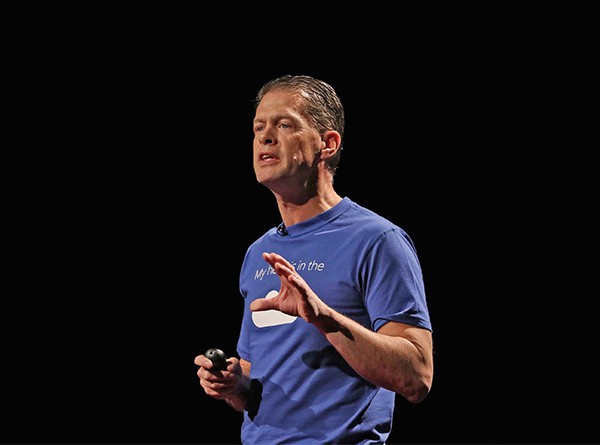
Pictured: TEDxUCD 2015 speaker Maeve O’Rourke.
‘Ted Talks’ have become well known on the internet. Visiting their website means being treated to a library of ground-breaking ideas and perspectives given through video presentation of speakers on stages at conferences, usually in the form of short, powerful talks.
There’s something there for everyone and it often broadens the mind in one visit. Ted Talks came from the TED conference idea started in 1984. The free online talks that many people are familiar with have been going on since 2006. They surpassed their one billionth view by 2012. Independently-run TEDx events help share ideas in communities around the world.
Dublin 4 got to taste the TED experience recently when UCD held its third annual TEDx event on 4th December last. The nine speakers and MC who took part in TEDxUCD 2015 were members of the wider researcher, lecturer, graduate and student community at UCD and they spoke on an extensive range of ideas worth spreading on the overall theme of ‘consequences’. TEDx events are licensed to independent local organisations, many of them universities around the world.
Living up to the essence of TED, all speakers gave insightful contributions throughout the day that would have the audience captivated.
Maeve O’Rourke, is an outstanding young lawyer who has worked on many ‘causes’ pro bono, and significantly the recent Magdalene laundries issues of girls being committed and kept at laundries attached to Catholic convents.
O’Rourke told the story of Brigid who was taken away to Magdalene laundries on the whim of a nun’s decision, and elaborated on the sad abuse of power that the nuns perpetuated on the detained girls.
She explained that the work was typically six days a week, and 10 hrs a day. Magdalene laundries cleaned State linen, even that of Aras an Uachtaráin.
10,000 girls from nine years of age were sent there for various reasons. The laundries were populated by a cross-section of girls who had been involved in minor misdemeanours and were sent there at the whim of a court as an alternative to prison, or for being pregnant, and included ‘second offenders’, and those who had been abused. From the girls’ perspective, it was not known when their stay would end.
O’Rourke added that it was not a uniquely Irish phenomenon, but when these institutions were closing down worldwide they were really in their ascendancy in Ireland. Sadly, when they first came under the international spotlight and were examined before the UN Committee against Torture, an Irish delegation initially defended Ireland’s records on the Laundries.

Above: Ted Talk trio in discussion.
Dr Cara Augustenborg an Environmental Scientist, informed the audience that world scientists are imploring politicians to reach targets to limit global warming by 2% maximum. She also warned us that “if we are to keep the Earth’s average surface temperature under two degrees celsius, we have to nearly eliminate most use of fossil fuels by 2050.”
Notably, she also added that that climate change interest in the general public has waned since 2007, perhaps reaching saturation in people’s minds as news of climate change issues revolve more on the endless problems rather than solutions. This may have a bearing on our tolerance to sustain interest, as continuous bad news about climate change dominate headlines, rather than solutions that are being conducted to counteract the challenges ahead.
Dr Augustenborg was selected as Ireland’s first Climate Leader as part of former U.S. Vice-President Al Gore’s Climate Reality Leadership Corps in 2013.
Dr Charlotte Blease of Wellcome Trust, University of Leeds, gave a passionate talk entitled ‘Philosophy is a right’. Blease explained “we expect our children to be literate and numerate but we should also expect them to be philosophically or critically aware about ideas, arguments, and different ways of viewing the world.”
Blease described how philosophy may have an image problem, confined in many people’s minds to the ivory tower. However, Blease outlined how philosophy may have more useful function to get clarity to life’s tough questions giving strong examples such as ‘Do we have free will?’, ‘Is there such a thing as a just war?’ or ‘Is abortion murder?’.
An interesting study led by Durham University on thousands of children in the UK was quite significant. The practice of one philosophical enquiry per week exercise led to significant gains in maths and reading, increases in self-esteem and confidence.
“Philosophy is not just for the privileged few who go to University,” said Duggan. In ending her talk she drove home to the audience that “philosophy is for everyone” and left us with wisdom that “philosophy teaches children to perceive and to tolerate the grey rainbow of ambiguity. What better training for beyond the classroom.”
Steven Duggan, the Director of Worldwide Education Strategy at Microsoft Corporation spoke at TEDxUCD 2015 with a talk entitled ‘Sickness: illiteracy as a fatal illness’. His talk pulled no punches, as stunning pieces of information came pounding at us one after the other. Facts that should make the world respond, facts that should slap us awake, facts that should have an implicit necessity for us to act fast on a global scale.

Above: Steven Duggan, Director of Worldwide Education Strategy at Microsoft Corporation.
Recently in Western Africa, the response necessary for the ebola outbreak cost one billion dollars. Only a third of that was spent on education in the same countries in that same time period. 21,000 children die from preventable diseases every day. A child that is born to a literate, as opposed to an illiterate mother, is 50% more likely to survive past the age of seven.
It’s a losing battle it seems, where the proportion of illiteracy has increased between the years of 2000 to 2015. There is a shortage of 1.7 million in the numbers of primary school teachers needed worldwide. Duggan outlined that digital literacy solutions would be extremely useful and far more cost effective, delivered through mobile phones for example. It would be possible to reach more people worldwide. As they were learning it would be possible to measure someone’s response to the material and catch problems at an earlier stage.
Intriguingly, Duggan showed us that the process of learning to read and write actually reshapes the brain. It contributes to brain development in a way that nothing else can match.
Over 750 million adults are illiterate. Over 70% of prisoners in the USA are functionally illiterate. The cost globally is two trillion dollars annually. Given the serious cost, it should be obvious to the literate about the illogical imbalance that exists, and that urgent action cannot be understated.
Psychologist Brendan Rooney reminded us in his talk that we can be in two places in time. He explained that he was referring to the ability of our minds to journey to different locations and times. “However,” he added, “these lessons and journeys are of no use if we don’t have a way to come back.”
Given the rest of the material we listened to, it was a pertinent point regarding action in relation to the knowledge that feeds us. Insightful information is of no consequence unless we put it to use.
By Ferg Hayden



